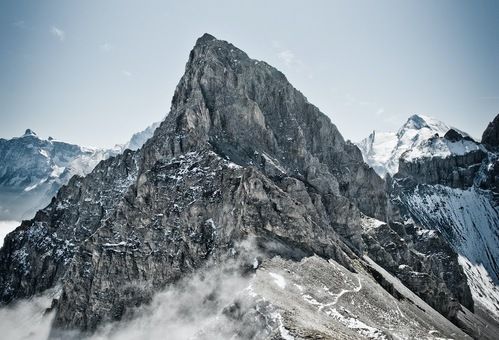Come and Worship at the Foot of Mount Zion

By Hannah MacAskill
“Therefore let us be grateful for receiving a kingdom that cannot be shaken, and thus let us offer to God acceptable worship, with reverence and awe, for our God is a consuming fire.” (Hebrews 12:28-29).
This is the climactic end of the powerful twelfth chapter of Hebrews, encouraging believers to live in gratitude and worship. What brings the author of Hebrews to this magnificent conclusion?
Hebrews 12 makes reference to a big moment in Israel’s history. The Israelites escaped the tyrannical rule of slavery in Egypt following God’s powerful plagues. They escaped the same Egyptians a second time when God closed the Red Sea over them. God led them with a pillar of fire and cloud, rained heavenly bread, provided miraculous water from a rock, defeated the Amalekites, and step by each dramatic step God proved His faithfulness to His chosen people. Then, God in his graciousness led them to the base of Mount Sinai and told them to prepare themselves, because “Behold, I am coming to you in a thick cloud.” (Exodus 19:9). With all this deliverance behind them, the Israelites obey and spend three days in preparation.
On the third day, God came. This theophany was no blue sky breeze at the Rocky Mountains. Exodus 19 describes thunder and lightning, thick clouds, fire, heavy smoke, and the whole mountain trembling. Put yourself in the Israelites’ place: at the base of the mountain heaving and storming with the sheer presence of God. They respond in Exodus 20:18-19:
“Now when all the people saw the thunder and the flashes of lightning and the sound of the trumpet and the mountain smoking, the people were afraid and trembled, and they stood far off and said to Moses, “You speak to us, and we will listen; but do not let God speak to us, lest we die.”
Moses served as the mediator for the people. They were about to receive God’s covenant, and they rightly trembled witnessing the greatness of His majesty. Knowledge of God’s power led them to proper fear. We today serve the same God, whose power should lead us to the same proper fear and then further to “acceptable worship, with reverence and awe” (Hebrews 12:28).
The author of Hebrews referenced this big moment in Israel’s history in chapter 12 as the first part of a comparison. The old covenant versus the new covenant. Mount Sinai versus Mount Zion. First, as described above, we read of the giving of the law to Moses as the Israelites quake at the bottom of the trembling Mount Sinai. But something more monumental has happened since the giving of this covenant. The gift of God Himself, Jesus Christ on earth to live, die, resurrect, and ascend, has come to pass. And with His coming, the new covenant is enacted. Starting in Hebrews 12:18, the author describes the terror of Exodus and the receiving of the first covenant. But the whole description is prefaced by the statement that this terror is NOT what we are coming to anymore, if we are in Christ. Instead of Mount Sinai, we have come to Mount Zion!
“But you have come to Mount Zion and to the city of the living God, the heavenly Jerusalem, and to innumerable angels in festal gathering, and to the assembly of the firstborn who are enrolled in heaven, and to God, the judge of all, and to the spirits of the righteous made perfect, and to Jesus, the mediator of a new covenant, and to the sprinkled blood that speaks a better word than the blood of Abel.” (Hebrews 12:22-24).
What grace, what hope, what a gift! We are not standing at the bottom of Mount Sinai looking terrified to Moses to be our mediator before this awe-inspiring God. By the grace of God, we are standing within Mount Zion and seeing a celebration, looking to Jesus - God in the flesh - with confidence that He is our mediator before God.
The author of Hebrews describes these two covenants, contrasting the two mountains, and this comparison provides us several reminders.
Our powerful God uses His power in Christ for our good and His glory. The sons of Korah say it this way in Psalm 46: “God is our refuge and strength, a very present help in trouble. Therefore we will not fear though the earth gives way, though the mountains be moved into the heart of the sea, though its waters roar and foam, though the mountains tremble at its swelling.”
Whatever is quaking in your life today - whatever seems uncertain - whatever God seems to be doing that terrifies you - whatever is outside of your control…it is firmly in God’s hands. And “The Lord of hosts is with us; the God of Jacob is our fortress” (Psalm 46:7). His presence in the storm, and Christ’s mediating on our behalf in this very moment, should lead us back to gratefulness, reverence, awe, and true worship. So we read again in comfort because the good God who revealed Himself to His chosen people at Mount Sinai continues revealing Himself to His chosen people today: “Therefore let us be grateful for receiving a kingdom that cannot be shaken, and thus let us offer to God acceptable worship, with reverence and awe, for our God is a consuming fire.”
“Therefore let us be grateful for receiving a kingdom that cannot be shaken, and thus let us offer to God acceptable worship, with reverence and awe, for our God is a consuming fire.” (Hebrews 12:28-29).
This is the climactic end of the powerful twelfth chapter of Hebrews, encouraging believers to live in gratitude and worship. What brings the author of Hebrews to this magnificent conclusion?
Hebrews 12 makes reference to a big moment in Israel’s history. The Israelites escaped the tyrannical rule of slavery in Egypt following God’s powerful plagues. They escaped the same Egyptians a second time when God closed the Red Sea over them. God led them with a pillar of fire and cloud, rained heavenly bread, provided miraculous water from a rock, defeated the Amalekites, and step by each dramatic step God proved His faithfulness to His chosen people. Then, God in his graciousness led them to the base of Mount Sinai and told them to prepare themselves, because “Behold, I am coming to you in a thick cloud.” (Exodus 19:9). With all this deliverance behind them, the Israelites obey and spend three days in preparation.
On the third day, God came. This theophany was no blue sky breeze at the Rocky Mountains. Exodus 19 describes thunder and lightning, thick clouds, fire, heavy smoke, and the whole mountain trembling. Put yourself in the Israelites’ place: at the base of the mountain heaving and storming with the sheer presence of God. They respond in Exodus 20:18-19:
“Now when all the people saw the thunder and the flashes of lightning and the sound of the trumpet and the mountain smoking, the people were afraid and trembled, and they stood far off and said to Moses, “You speak to us, and we will listen; but do not let God speak to us, lest we die.”
Moses served as the mediator for the people. They were about to receive God’s covenant, and they rightly trembled witnessing the greatness of His majesty. Knowledge of God’s power led them to proper fear. We today serve the same God, whose power should lead us to the same proper fear and then further to “acceptable worship, with reverence and awe” (Hebrews 12:28).
The author of Hebrews referenced this big moment in Israel’s history in chapter 12 as the first part of a comparison. The old covenant versus the new covenant. Mount Sinai versus Mount Zion. First, as described above, we read of the giving of the law to Moses as the Israelites quake at the bottom of the trembling Mount Sinai. But something more monumental has happened since the giving of this covenant. The gift of God Himself, Jesus Christ on earth to live, die, resurrect, and ascend, has come to pass. And with His coming, the new covenant is enacted. Starting in Hebrews 12:18, the author describes the terror of Exodus and the receiving of the first covenant. But the whole description is prefaced by the statement that this terror is NOT what we are coming to anymore, if we are in Christ. Instead of Mount Sinai, we have come to Mount Zion!
“But you have come to Mount Zion and to the city of the living God, the heavenly Jerusalem, and to innumerable angels in festal gathering, and to the assembly of the firstborn who are enrolled in heaven, and to God, the judge of all, and to the spirits of the righteous made perfect, and to Jesus, the mediator of a new covenant, and to the sprinkled blood that speaks a better word than the blood of Abel.” (Hebrews 12:22-24).
What grace, what hope, what a gift! We are not standing at the bottom of Mount Sinai looking terrified to Moses to be our mediator before this awe-inspiring God. By the grace of God, we are standing within Mount Zion and seeing a celebration, looking to Jesus - God in the flesh - with confidence that He is our mediator before God.
The author of Hebrews describes these two covenants, contrasting the two mountains, and this comparison provides us several reminders.
- The kingdom that Jesus brought, the new covenant, we do not deserve but is fully ours in Christ. Therefore, gratitude is the right response. “He who did not spare His own Son but gave Him up for us all, how will He not also with Him graciously give us all things?" (Romans 8:32)
- Gratitude should lead us into worship. Not just any worship, but reverential and awe-filled worship. “Ascribe to the Lord the glory due His name; worship the Lord in the splendor of holiness.” (Psalm 29:2)
- What leads us into this reverential worship is the knowledge that the One we worship today is the same God that descended in darkness and thunder on Mount Sinai. He is a consuming fire, and Jesus’ death is what saves us from consumption. “Since, therefore, we have now been justified by His blood, much more shall we be saved by Him from the wrath of God.” (Romans 5:9).
Our powerful God uses His power in Christ for our good and His glory. The sons of Korah say it this way in Psalm 46: “God is our refuge and strength, a very present help in trouble. Therefore we will not fear though the earth gives way, though the mountains be moved into the heart of the sea, though its waters roar and foam, though the mountains tremble at its swelling.”
Whatever is quaking in your life today - whatever seems uncertain - whatever God seems to be doing that terrifies you - whatever is outside of your control…it is firmly in God’s hands. And “The Lord of hosts is with us; the God of Jacob is our fortress” (Psalm 46:7). His presence in the storm, and Christ’s mediating on our behalf in this very moment, should lead us back to gratefulness, reverence, awe, and true worship. So we read again in comfort because the good God who revealed Himself to His chosen people at Mount Sinai continues revealing Himself to His chosen people today: “Therefore let us be grateful for receiving a kingdom that cannot be shaken, and thus let us offer to God acceptable worship, with reverence and awe, for our God is a consuming fire.”

